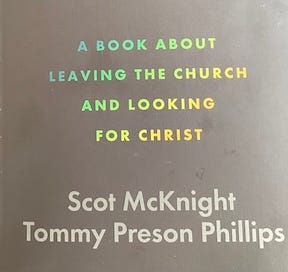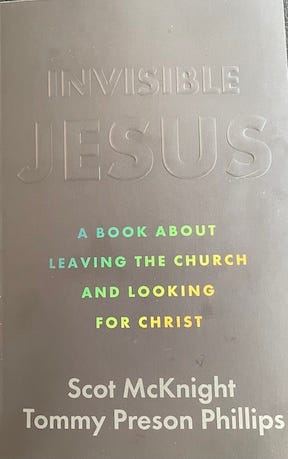Last weekend I had the wonderful chance to read Invisible Jesus: A Book About Leaving The Church and Looking for Christ by Scot McKnight and Tommy Preson Phillips. I have been following Scot’s work for years and his newsletter is something I look through most mornings (especially when he’s the one writing). When I heard that Scot and his co-author Tommy had written a book on deconstruction, I knew I had to read it.
I’ve been tracking the deconstruction process and those it has impacted for over a decade. In 2013, the late Rachel Held Evans wrote a piece for CNN on “Why Millennials are Leaving the Church”. I had amplified Rachel’s thoughts with a post on my now defunct WordPress site titled “Millennial Canaries”, arguing that the concerns of those then-Millennials presaged the future of American religion, especially within evangelicalism. I was blown away when Rachel shared my post with her followers, marking my first experience with a post going viral.
That launched a multi-year project exploring the ways that evangelicalism was fragmenting and how younger evangelicals were adopting new forms of religious expression not based on culture wars but on engaging others. I collected data on young evangelical clergy. I analyzed a series of evangelical memoirs (a project I still enjoy). I attended the first two “Evolving Faith” conferences organized by Rachel and Sarah Bessey, the second coming after Rachel’s untimely death. I thought there was a book in there arguing why these changes marked something important sociologically. Publishers didn’t agree, suggesting that I was writing about people who had left evangelicalism and were never coming back. That may be true, but it has resulted in the mess in which the evangelical church now finds itself.
Enough about me; let me move on to why Invisible Jesus is such an important book. Perhaps the argument was more palatable when coming from a biblical scholar and a pastor than from a sociologist. But their book is on solid ground sociologically as well as scripturally.
The thesis of the book is easily stated: When people are deconstructing, they are offering a prophetic witness that something is wrong in the church (not unlike canaries in a coal mine!). That something is that Jesus is missing.
We believe something bigger is happening in the church, something that will continue to grow and that we dare not ignore. We believe deconstruction is a prophetic movement resisting a distorted gospel. It is not a problem; it is a voice. And we need to listen to what it is saying to the church. (1)
The book is full of stories from the authors, from Scot’s students, from Tommy’s parishioners, from other writers, and from people they picked up along the way in their research.
Throughout the book, they make some relevant contrasts. On the one hand is the spectator, entertainment, sermon oriented, pastor centered approach to worship in way too many churches. This stands in stark relief to the legitimate questions and concerns that deconstructors have. And when you add in their analysis of what Jesus did, was, and said of himself, Scot and Tommy come to the conclusion that those departing were looking for this Jesus and couldn’t figure out why they weren’t finding him at church.
Two things from my own work echo their argument. One of the memoirs I analyzed was Sarah Bessey’s Out of Sorts. She analogized her faith journey as unpacking old boxes in her grandmother’s house to find her core beliefs. She stopped attending church for six months (as a pastor’s wife!). She read no scripture but the Gospels during that period and hung her faith entirely on Jesus.
Jen Hatmaker spoke at the first Evolving Faith conference. A nationally known Christian author, she was blackballed when she publicly came out as LGBTQ+ affirming. Lifeway dumped her books (back when they had stores). The evangelical gatekeepers made her a pariah. When she described her experience, she said that she was “cast into the wilderness” by others. Once there, she found the road not that bad and the company pretty decent.
In the last chapter, Scot and Tommy write the following:
Certainty and fundamentalism are tied together at the head, waist, and ankle. Fundamentalism is shaped by rules, with many in fundamentalism with a subtle, constant feeling of doom. One does not shed one’s fundamentalist conscience with a baptism or a shift in denomination. Former fundies will still laugh with one another about some rule they grew up with — like not going to a movie, abstaining from alcohol, or refusing to attend a wedding at a Catholic church — but they’ll long remember the effects of the socialization they received from their parents, churches, and pastors. The rules of their youth shaped them and continue to shape them. They were firm and sure.
Deconstructors frequently walk out the door of these rule-shaped churches. More often than not, they leave because they choose to live, not by rules, but in the way mapped by Jesus. When Jesus said, “I am the way” (John 14:6), he offered to his disciples a new, fresh way to live a flourishing life. The old way was given to them through Moses, but Jesus positioned himself as a new and improved Moses, a Moses 2.0. Jesus formed a new group — a kingdom coalition — and called people away from other groups. (192-193)
Most deconstructors leave in order to follow the Way, and at the very least, the dimensions of the Way we discuss next are most attractive to them. Over and over we have observed that deconstructors are not walking out the church doors to enter a life of sin. Rather, statistics show they want a more Jesus-centered religion. (194)
This is very important book. At a time when the American church is becoming homogenized, politically compromised, growth oriented, power conscious, and a spectacle, the deconstructors are telling us that it doesn’t have to be this way. If we listen to them, we’d all be better off.
Maybe we just need that old Andre Crouch song: “Jesus Is the Answer, For the World Today.” May it be so.





Today in class, I just talked about "rule-based" religion (any fundamentalist religion) and "relationship-based" religion (love God/love neighbor). We applied this to the issue of abortion and how the former wants to reduce abortions by outlawing them and the later by taking care of women (making birth control available and stopping gender violence). We then discussed which strategy is more likely to reduce the number of abortions.
In regard to Jesus not being found in the church - a few years ago, I was transformed by realizing what Heb. 13:11-14 was actually saying. Jesus cannot be found in the "holy" places (Temple or Jerusalem). Jesus is "outside the city" where the "unclean" human trash has been tossed by religious people. If I want to encounter Jesus, I need to go to where those rejected by the church reside...
I’m in the gospels, Romans, and Acts right now and there’s so much discussion about rules versus heart, command-led versus Spirit-led, outward actions of eating and doing and praying versus intent. There truly is nothing new under the sun that we are back at the same issues as in Jesus’ day.